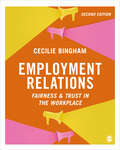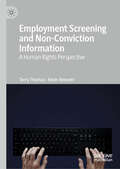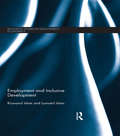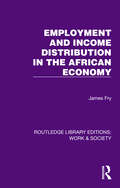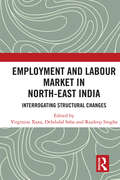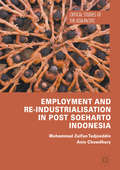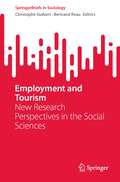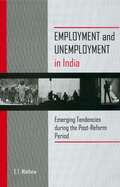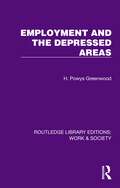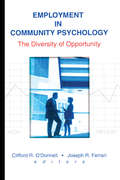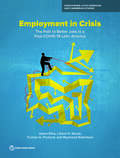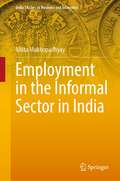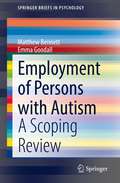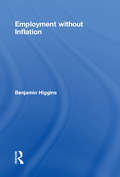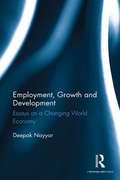- Table View
- List View
Employment Relations: Fairness and Trust in the Workplace
by Cecilie Bingham*Shortlisted in the Management and Leadership Textbook Category at CMI Management Book of the Year Awards 2017* 'In this new, original book, Cecilie Bingham puts fairness, trust, organisational justice, and power at the heart of employment relationships in a variety of settings. This thought-provoking text provides academic, practical and theoretical insights into the contested nature of contemporary work and employment relations at workplace level. It should become essential reading for students, scholars, practitioners and policy-makers in the field.' - Professor David Farnham, University of Portsmouth, UK Mapped to CIPD learning outcomes at level 5 and level 7, Employment Relations: Fairness and Trust in the Workplace critically reflects on current research, commentary, evidence and practice in the employment relationship with a unique focus on organizational justice. Combining theoretical concepts, tools and models with practical examples, it is packed with innovative learning features designed to help students to engage with the subject, including: Extracts of recent news items linked to chapter content Insights to help link theory and practice supported by podcast interviews on the book’s companion website A series of case study ‘snippets’, activities and revision exercises. The book is complimented by a companion website featuring a range of tools and resources for lecturers and students, including PowerPoint slides, Instructors' manual, multimedia links and free SAGE journal articles. Suitable for Undergraduate and Postgraduate students on Employment Relations, Industrial Relations or HRM courses.
Employment Relations: Fairness and Trust in the Workplace
by Cecilie Bingham'In this new, original book, Cecilie Bingham puts fairness, trust, organisational justice, and power at the heart of employment relationships in a variety of settings. This thought-provoking text provides academic, practical and theoretical insights into the contested nature of contemporary work and employment relations at workplace level. It should become essential reading for students, scholars, practitioners and policy-makers in the field.' - Professor David Farnham, University of Portsmouth, UK Mapped to CIPD learning outcomes at level 5 and level 7, Employment Relations: Fairness and Trust in the Workplace critically reflects on current research, commentary, evidence and practice in the employment relationship with a unique focus on organizational justice. Combining theoretical concepts, tools and models with practical examples, it is packed with innovative learning features designed to help students to engage with the subject, including: Extracts of recent news items linked to chapter content Insights to help link theory and practice supported by podcast interviews on the book's companion website A series of case study 'snippets', activities and revision exercises. Suitable for Undergraduate and Postgraduate students on Employment Relations, Industrial Relations or HRM courses.
Employment Relations: Fairness and Trust in the Workplace
by Cecilie BinghamMapped to CIPD learning outcomes, Employment Relations: Fairness and Trust in the Workplace (second edition) critically reflects on current research, commentary, evidence and practice in the employment relationship field with an international approach and a focus on globalization. Combining theoretical concepts, tools and models with practical examples, it is packed with innovative learning features designed to help students to engage with the subject, including: Extracts of recent news items linked to chapter content A series of case studies from a range of contexts, activities and revision exercises The book is complimented by lecturer resources, including a comprehensive instructor’s manual and PowerPoint slides. Suitable for Undergraduate and Postgraduate students on Employment Relations, Industrial Relations or HRM courses.
Employment Relations: Fairness and Trust in the Workplace
by Cecilie BinghamMapped to CIPD learning outcomes, Employment Relations: Fairness and Trust in the Workplace (second edition) critically reflects on current research, commentary, evidence and practice in the employment relationship field with an international approach and a focus on globalization. Combining theoretical concepts, tools and models with practical examples, it is packed with innovative learning features designed to help students to engage with the subject, including: Extracts of recent news items linked to chapter content A series of case studies from a range of contexts, activities and revision exercises The book is complimented by lecturer resources, including a comprehensive instructor’s manual and PowerPoint slides. Suitable for Undergraduate and Postgraduate students on Employment Relations, Industrial Relations or HRM courses.
Employment Screening and Non-Conviction Information: A Human Rights Perspective
by Kevin Bennett Terry ThomasThis book provides a critical overview of the policy frameworks underpinning the contemporary practices of non-conviction information disclosure during pre-employment ‘screening’. It questions how a man can walk free from a criminal court as an innocent person only to have all the court details of his acquittal passed to any potential employer.Despite several million ‘enhanced’ criminal background checks being performed each year, there has been little discussion of these issues within academic literature. Non-conviction information, also known as 'police intelligence', is a less well-known check provided alongside the criminal record check. This book seeks to define what is meant by non-conviction information and to provide a clear and simple explanation of how this decision making process of police disclosure to employers is made. It also considers the extent to which these practices have been subjected to legal challenges within the UK and explores how public protection is balanced against individual rights.
Employment Vignettes
by Lena G. Goldberg Chad M. CarrSix vignettes drawn from decided cases explore legal and business issues in hiring, firing, promoting, and demoting employees, with an emphasis on protected classes, pretext, and anti-discrimination laws in the setting of start-ups and privately held companies.
Employment and Citizenship in Britain and France
by John Edwards Jean-Paul RévaugerThis title was first published in 2000: One of the most significant features to emerge in the world of work during the past decade has been the change from long-term employment, often with one employer, to a pattern of short-term, flexible working arrangements involving short-term contracts, frequent spells of unemployment, rapid movement into and out of employment and greater labour mobility. This text examines the social and economic consequences of this employment flexibility. The book derives from the 2nd Anglo-French Conference on the Transferability of Social Policy held in 1998, which focused on the problems created by employment flexibility and the appropriate policy responses, it also presents commentaries on the consequences of flexibility in Britain and France. It brings together British and French perspectives on such policy questions as the impact on families and their ability to plan in an atmosphere of economic insecurity, the manner in which French and British welfare systems are adapting, the impact on citizens' rights, the need, in both countries, to make pension arrangements more adaptable, and the potential for a "European citizenship" approach to the problem.
Employment and Development under Globalization
by Samuel CohnGlobalization has changed the models of development that are open to most states both in the industrialized and less industrialized world. Using the unusual case of Brazilian barbers, beauticians, hotels and restaurants, Samuel Cohn lays out a model of the role of the state and development that is an alternative to more highly visible formulas associated with East Asia. By identifying a number of unjustly ignored government initiatives that substantially increase employment and significantly reduce poverty, he provides a third alternative to the development strategies being put forward by traditional and critical development scholars. The programs for achieving this are cheap, uncontroversial and can be effectively implemented even by governments with fiscal crises and weak administrative capacity. Yet the result is development that reduces social inequality, relieves poverty and insures the more equitable division of well-being.
Employment and Inclusive Development (Routledge Studies in Development Economics)
by Iyanatul Islam Rizwanul IslamIssues relating to employment and labour have once again come to the fore of global policy debates in the wake of the widespread unemployment that has accompanied the current financial crisis. In the developing world, there is a growing realization that productive employment promotion and social protection have to be at the core of inclusive growth and development. This book supports the view that employment is a cross-cutting issue shaped by macroeconomic and microeconomic policy interventions, and provides a capacious framework to analyse the complexity of this global debate. It covers a wide range of issues that have received insufficient attention in the discourse of development and labour economics. These include the impact of macroeconomic policies on employment, labour rights, the development of human capabilities and employability, youth employment, the benefits and costs of labour market flexibility, and the importance of social protection for all. This important book aims at filling this gap by revisiting old debates and reconnecting them to the contemporary context, combining analyses with relevant empirical evidence. It will appeal to a diverse readership of academic institutions and think-tanks, international organizations, bilateral donors working on development issues and policy-makers in developing countries.
Employment and Income Distribution in the African Economy (Routledge Library Editions: Work & Society)
by James FryZambia is one African country which has evolved from being a classic example of a colonial economy to become an independent state with a large export enclave. The economy has had to face structural problems that have at one time or another, characterised other African economies. This study therefore throws light upon many aspects of the labour markets elsewhere in Africa. Originally published in 1979, this book analyses 3 stages of development in the Zambian labour force: the first running up to 1930 when the Copperbelt was opened up, was followed by over 30 years of economic and employment growth, leading to the emergence of a wage and skill structure that differentiated strongly between Africans and non-Africans. Finally there is the period since the early 1960s when the racial basis for employment and earnings restrictions have been lifted but where inequalities remain. Each of these stages is examined in detail and complemented by a theoretical discussion of the factors affecting the development of the wage structure and earnings differentials within Zambia. The impact of government policy income distribution is also discussed and illustrated by means of a comparative study of government income policies in Zambia, Tanzania and Kenya.
Employment and Labor Law (9th Edition)
by Patrick J. Cihon James Ottavio CastagneraThinking about a Human Resources career after you graduate? Employment and Labor Law is written for you, the non-legal professional, and contains all you need to know to prepare for any labor situation in the corporate world. Inside you'll find the latest information on federal and state employment laws and read real-world cases that clarify the material.
Employment and Labour Market in North-East India: Interrogating Structural Changes
by Debdulal Saha Virginius Xaxa Rajdeep SinghaThis book examines the structural changes in the labour market in North-East India. Going beyond the conventional study of tea and agricultural sectors, it focuses on the nature, pattern and structure of work and employment in the region as well as documents emerging shifts in the labour force towards farm to non-farm dynamics. The chapters explore historical developments in employment patterns, labour market policies, issues of gender and social-religious dimensions, as well as point to growing forms of casual, informal and contractual labour across sectors. Through large-scale data and detailed case studies on unfree labour in plantations and those employed in crafts, handloom and the manufacturing industry, the book provides insights into labour and employment in the region. It also delves into the temporal and spatial dimensions of non-farm employment and its relationship with rural income distribution and labour mobility. By bringing interdisciplinary perspectives from scholars working on North-East India, this work fills a major gap in the political economy of the labour market in the region. The volume will be useful to scholars and researchers of development studies, North-East India studies, labour studies, economics, sociology and political science as well to those involved with governance and policymaking.
Employment and Re-Industrialisation in Post Soeharto Indonesia: Labour Market Institutions In Democratic And Decentralized Indonesia (Critical Studies of the Asia-Pacific)
by Anis Chowdhury Mohammad Zulfan TadjoeddinThis book studies the challenges for Indonesia, once a miracle economy, as it faces premature deindustrialisation, rising inequality and domestic and external factors impacting its export-oriented industrialization. Since the fall of Soeharto, Indonesia has undergone a far-reaching systemic transition from centralised and autocratic governance to a highly decentralised and democratic system. Complicated by regional variations, the country is now being called upon to respect labour rights and, amidst slow global economic recovery, is facing increased competition from other low-labour-cost countries, especially within the ASEAN Economic Community. Tadjoeddin and Chowdhury posit that Indonesia cannot recreate its past miracle based on cheap labour and suppression of labour rights. It will need to move quickly to high value-added activities driven by productivity growth and to develop its domestic market.
Employment and Tourism: New Research Perspectives in the Social Sciences (SpringerBriefs in Sociology)
by Bertrand Réau Christophe GuibertThis book proposes a new and original analysis of tourism employment in order to understand the multiple dimensions (economic, cultural, temporal, geographical, etc.) of this cross-cutting sector. It offers an overview of French knowledge, mainly in sociology, anthropology, geography and law, in the light of singular empirical fields. The diversity of disciplinary approaches, methods and questions allows for comparisons between various segments of the tourism employment market in France and with other countries. Based on in-depth case studies, this book will be a valuable resource for students and academics who wish to understand the specificities of tourism employment and the methods for studying them, as well as for professionals in the sector and decision-makers in European tourist destinations who wish to enrich their approaches to these phenomena.
Employment and Unemployment in India: Emerging Tendencies During the Post-Reform Period
by E T MathewThis book critically examines the emerging trends in employment and unemployment in the Indian Economy during the post-reform era. Using the latest round of NSS data, the author studies the impact of these structural economic reforms on: – Employment generation, with reference to different and competing sectors—rural / urban; agricultural / non-agricultural; organised / unorganised. – Unemployment and underemployment, in terms of the apprehension that economic reforms lead to loss of employment. –Casualisation of employment— that is, a belief that reforms lead to increase in the proportion of casual labour. – Information of employment –Feminisation of employment. Unique in the fact that there is no comparable work on the topic, this book provides an excellent organisation of the material and a lucid presentation of the discussion and will be of enormous interest to economists, social scientists, policy makers, scholars and students.
Employment and the Depressed Areas (Routledge Library Editions: Work & Society)
by H. Powys GreenwoodOriginally published in 1936 during the Great Depression this book analyses the efforts of the British Government to relieve the rampant unemployment in the most distressed areas and discusses why these efforts were ineffective. The book put forward a number of proposals to help ease unemployment and encourage investment in depressed areas, such as the development of trading estates, investment in transport and social services.
Employment at Will: A Legal Perspective
by Christopher M. Bruner Lynn Sharp PaineProvides a brief overview of the employment-at-will doctrine, an important concept unique to the U.S. legal system and business landscape. Briefly surveys the history and development of this doctrine and certain limitations and exceptions to it, as well as some of the distinguishing features of the employment termination process in the United States relative to other countries.
Employment at Will: A Legal Perspective
by Christopher M. Bruner Lynn Sharp PaineProvides a brief overview of the employment-at-will doctrine, an important concept unique to the U.S. legal system and business landscape. Briefly surveys the history and development of this doctrine and certain limitations and exceptions to it, as well as some of the distinguishing features of the employment termination process in the United States relative to other countries.
Employment in Community Psychology: The Diversity of Opportunity
by Joseph R Ferrari Clifford R O'DonnellDiscover the first book on employment opportunities in community psychology!Employment in Community Psychology: The Diversity of Opportunity is the first psychology career reference book for undergraduate psychology majors deciding on graduate schools, for graduate students in psychology seeking employment, and for psychology faculty advising their students. This book answers the questions “What can you do with a graduate degree in community psychology?” and “Who employs community psychologists?” Employment in Community Psychology addresses these questions through examples of graduates educated in community psychology and employed in diverse applied, research, and academic settings. In Employment in Community Psychology, you will explore the diversity of community psychology employment opportunities through the stories of current graduate students, community psychologists on their first job, and psychologists who have well-established positions in community research and action. Each experience is told in a story-telling style allowing the reader to grasp a deeper understanding of the employment opportunities that cannot be obtained through abstract description alone. Some of the experiences that highlight opportunities in the field include:working in the Institute for Families in Society at the University of South Carolina as a Research Associate working as a researcher at the Korea Institute of Social Psychiatry to determine how primary prevention and action research can be applied to the promotion of adolescent mental health in Korean society doctoral studies that developed into the first community psychology position focusing on the issues of social justice and reconciliation between Indigenous and non-Indigenous groups in Australian town non-traditional academic positions in psychology working as a social worker for Native non-profit health corporation in Alaska a policy-oriented community psychologist, or a c.p. in the disabilities field entering a second career in community psychology at mid-lifeEmployment in Community Psychology is an essential tool for undergrads and graduate students considering a career in community psychology. The rich palette of community psychology experiences that are laid out for the career researcher and advisor are sure to assist students in deciding what area of community psychology they would like to pursue.
Employment in Crisis: The Path to Better Jobs in a Post-COVID-19 Latin America (World Bank Latin American and Caribbean Studies)
by Joana Silva Robertson Truman Packard Liliana SousaA region known for its volatility, Latin America and the Caribbean (LAC) has suffered severe economic and social setbacks from crises—including the COVID-19 pandemic. These crises have taken their toll on careers, wage growth, and productivity. Employment in Crisis: The Path to Better Jobs in a Post-COVID-19 Latin America provides new evidence on the effects of crises on the region’s workers and firms and suggests several policy responses that can bolster long-term and inclusive economic growth. This report has three key findings. First, crises lead to persistent employment losses and accelerate structural changes away from the formal sector. This change occurs more through reductions in the creation of formal jobs than through job destruction. Second, some workers recover from crises, while others are permanently scarred by them. Low-skilled workers can suffer up to a decade of lower earnings caused by crises, while high-skilled workers rebound fast, exacerbating the LAC region’s high level of inequality. Formal workers suffer smaller employment and wage losses in localities with higher rates of informality. And the reduced job flows caused by crises decrease welfare, but workers in localities with more job opportunities, whether formal or informal, bounce back better. Third, crises’ cleansing effects can increase efficiency and productivity, but these effects are dampened by the LAC region’s less competitive market structure. Rather than becoming more agile and productive during economic downturns, protected sectors and firms gain market share and crowd out others, trapping valuable resources. This report proposes a three-pronged mix of policies to improve the LAC region’s responses to crises: •Create a more stable macroeconomic environment to smooth the impacts of crises, including automatic stabilizers such as unemployment insurance and short-term compensation programs; •Increase the capacity of social protection and labor programs to respond to crises and coalesce these programs into systems that complement income support with reemployment assistance and reskilling opportunities; and •Tackle structural issues, including the lack of product market competition and the spatial dimension behind poor labor market adjustment—a “good jobs and good firms†? agenda.
Employment in the Informal Sector in India (India Studies in Business and Economics)
by Ishita MukhopadhyayThis book examines the transition, transformation and future of the informal sector, informal work and informal workers in India from the perspectives of development economics as well as those of international organisations.Though the informal sector has a long tradition in India, it has been transformed in the wake of neoliberal economic policy. The sector took on new prominence in the 1980s, and has since grown much stronger and established itself as the country’s dominant sector. Several reports on the informal sector appeared during this period, and the status of the sector in India is positioned in the context of this international scenario.The major debate concerns the definition of this sector. While international labour statisticians had suggested a mechanism of definition and measurement of the sector, Indian official statistics took a different approach. The book analytically elaborates the different definitions and measurement controversies in different countries and contextualises the official Indian position. While deliberating on the size, contribution, productivity, and potential of the informal sector, the heterogeneity and decomposition of the sector with respect to these aspects are also suggested. The book develops a political economic interpretation of the historical transition of the informal sector in India, employing heterodox economics as a theoretical basis, with a critical note on standard neoclassical economic analysis. The final part of the book focuses on understanding the development of capitalism in the country under neoliberalism, as that development is crucial to understanding the informal sector in any country, and particularly in India. In the current context, the volume will be of great relevance to researchers, non-government organizations, policy makers and international organisations working on the topic.
Employment of Persons with Autism: A Scoping Review (SpringerBriefs in Psychology)
by Emma Goodall Matthew BennettThis scoping review furnishes the reader with a contemporary overview of research about employment conditions related to persons on the autism spectrum. In this book six guiding questions are used to address various aspects of employment for persons on the autism spectrum, including job opportunities, removing barriers to employment, becoming successful at work, and management issues for employers working with people on the autism spectrum. The contents of this scoping review can appeal to many different readers. Persons on the autism spectrum can learn about proven strategies that they can use to maximise their success in the workplace. Employers, tertiary students, and lay people can learn methods that they can use to help employees on the autism spectrum obtain and maintain employment. Finally, researchers can learn about the current limitations of our knowledge about the autism spectrum and employment.
Employment without Inflation
by Benjamin HigginsThe world economy has undergone a fundamental transformation in recent decades and theoretical structures inherited from the 1930s through the 1950s, while retaining large elements of truth, are inadequate to deal with current problems. Benjamin Higgins feels that for a society such as the United States a fiscal policy needs to be adopted that can deal simultaneously with existing unemployment and inflation. He suggests three possible governmental policies: stimulating a high rate of long-run growth, by use of reward innovations and by maintaining the highest possible level of scientific and technical activity; isolating regions that are generators of inflation and others that are pools for unemployment; and establishing a system of direct controls similar to those used in wartime. Higgins describes the transformation of the cogent prewar business cycle, with its alternations of inflation or unemployment, then a transitional period of underemployment equilibrium and secular stagnation, and finally, the strange new world of today, one with economic fluctuations in the form of shifting trade-off curves and loops. He then applies his new paradigm to current problems, showing why they cannot be managed through macroeconomic monetary and fiscal policy. Higgins offers case studies of efforts to fight inflation and unemployment, and to reduce regional gaps, to show their strengths and weaknesses. It can be said that unemployment always results from too many people chasing too few jobs, and inflation is always caused by too much money chasing too few goods and services. Beyond such banal generalizations, Higgins maintains there is no single cause for either unemployment or inflation, and thus no single cure can be prescribed for either, let alone for both at once. Nor is it to be expected that the appropriate cure will prove to be the same in all countries at all times. He suggests that an optimal blend of monetary and fiscal policy that will produce the "minimum discomfort" is a good start. Employment Without Inflation will be of direct policy interest to economists, sociologists, and national planners.
Employment, Growth and Development: Essays on a Changing World Economy
by Deepak NayyarThis book examines the critical themes of employment, growth and development to focus on challenges and opportunities, both old and new, in the contemporary world economy. The essential theme that runs through the book is that there is a strong relationship not only between employment and growth, but also between employment and development, where the causation runs in both directions. The author shows how employment transforms economic growth into meaningful development by providing livelihoods and incomes to people. While the book is primarily concerned with developing countries, it considers industrialized countries as points of reference or comparison, since the latter are a large part of an interdependent world, in which problems faced by the two sets of countries are frequently connected and sometimes common. The ten essays in this volume also provide a macroeconomic analysis of development problems situated in the wider context of a changing world economy, exploring possible solutions, to understand the implications for countries and for people. A timely collection by an eminent economist, this book will be useful to teachers, students and researchers in economics, especially those interested in macroeconomics, political economy and development studies.
Employment, Income Distribution and Development
by Frances StewartFirst Published in 1975. Routledge is an imprint of Taylor & Francis, an informa company.

